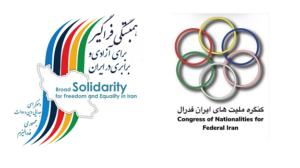Ahwazis host a conference inviting non-Persian representative discussed the future of their people in Iran on Sunday 22nd March 2015. Representatives of Arabs, Kurds, Baluchis and Azaris political parties highlighted the situation in Iran and region and focused on federalism and independence options for their people. The political activists suggested the solid and consistent work together is the best way to ouster of the Iranian regime in order to achieve freedom and democracy for nations in Iran.
The conference which titled “the rights of nations in Iran between federalism and independence”, the participants discussed their views on federalism, which they considered it as the best option to replace the current Iranian regime.
The conference was organized under the auspices of “Democratic Solidarity Party of Al-ahwaz” (DSPA), as one of the founders of the “Congress of Nations for a Federal Iran” which includes parties and organizations of Kurds, Ahwazi Arabs, Azerbaijani Turks, Turkmen, Baluchis and Lurs.
The conference started with the speech of the party read by Nahi Saedi where he confirmed that “the federal state does not mean to concede any rights of Ahwaz Arabs, but it is the objective guarantee and pragmatic access to these rights in a streamlined and dependency on international guarantees that may link to” international intervention “brings back our rights via the “referendum” which will assure our right to self-determination.
The party condemns the interventions of the Iranian regime in the regional countries such Iraq, Syria, Yemen and Lebanon. These intervention will end to swamp the regime and is an opportunity for the non-Persian nations to collaborate together to ouster the regime.
The Democratic Party of Iranian Kurdistan represented by Mr. Ahmadi, as it is the main Kurdish party and established a Kurdish state in Mahabad in east of Iran in 1946. Ahmadi described the political, economic, social, cultural and military aspects of federalism.
Rahim Bondehee, the Baluchi political party, said all the Baluchi parties, armed and disarmed, even Aladl party, believe in federal system is the best way to achieve our rights. Bondehee added that their people are subjected to political religious discrimination by the Iranian regime.
Daniel Brett, Founder of the British Ahwazi Friendship Society, said that the UN Charter states that there is a right to self-determination of all people. However, it has been ambiguous precisely which groups the term ‟people‟ had been envisaged to comprise. Brett added that countries such Bangladesh, East Timor, South Sudan, Eritrea and Kosovo are economic basket cases. The process of the independence struggle in these countries has caused massive internal displacement, the destruction of infrastructure and huge loss of life. Brett emphasised that Iran would not allow Arabistan or Al-Ahwaz to walk away with independence without destroying the country’s infrastructure and its resources.
Yousef Aziz Banitorof, Combat centre of Racism and anti-Arabs in Iran, said although the independence is a natural and legal requirement, but we should choose between the options of independence or federalism of Ahwazi Arabs and must consider the international, regional and internal situations in Iran and Ahwaz specifically. Azizi also showed that the majority of the major influential countries like the United States and Europe and the Islamic world, China and Russia and regional countries such as Turkey, Iraq, and Saudi Arabia do not want the disintegration of Iran. He stressed that the establishment of a federal system instead of the current system will guarantee the rights of non-Persian peoples, including the Ahwazi Arab people.
Jaber Ahmad, the Ahwazi Arab researcher and activist, pointed out that intellectual and the most influential Iranian parties support the federal system, while some others strongly opposed the system. Yet today we are witnessing the increasing number of parties that support the establishment of a federal system in Iran as an alternative to the current regime. He stressed that the current Iranian dictatorship with very diverse country with multi-ethnic societies will not continue as it does not meet the nations demands and rights. The policy of “one state, one language, and one religion” does not meet the right of citizenship and diverse ethnicities suffer from discrimination and systematic oppression under this policy.
Karim Abdian, top advisor of the DSPA ended the conference stated that there is no nation in the world who have struggled and achieved independence without passing through the federal or autonomy phase and mentioned as examples such Montenegro and South Sudan. Abdian added that our main goal as nations to take over the power from the Persians who rule and hegemony the multi-nations country. The demand for independence remains as one of our legitimate and legal aspirations but not current goal. Abdian emphasised that the US does not want to collapse or disintegration of Iran at the present time where there is a great desire for the US oil companies to involve into Iranian oil market, which is dominated by Russian, Chinese and Indonesian companies currently.
By: Amir Saedi
















